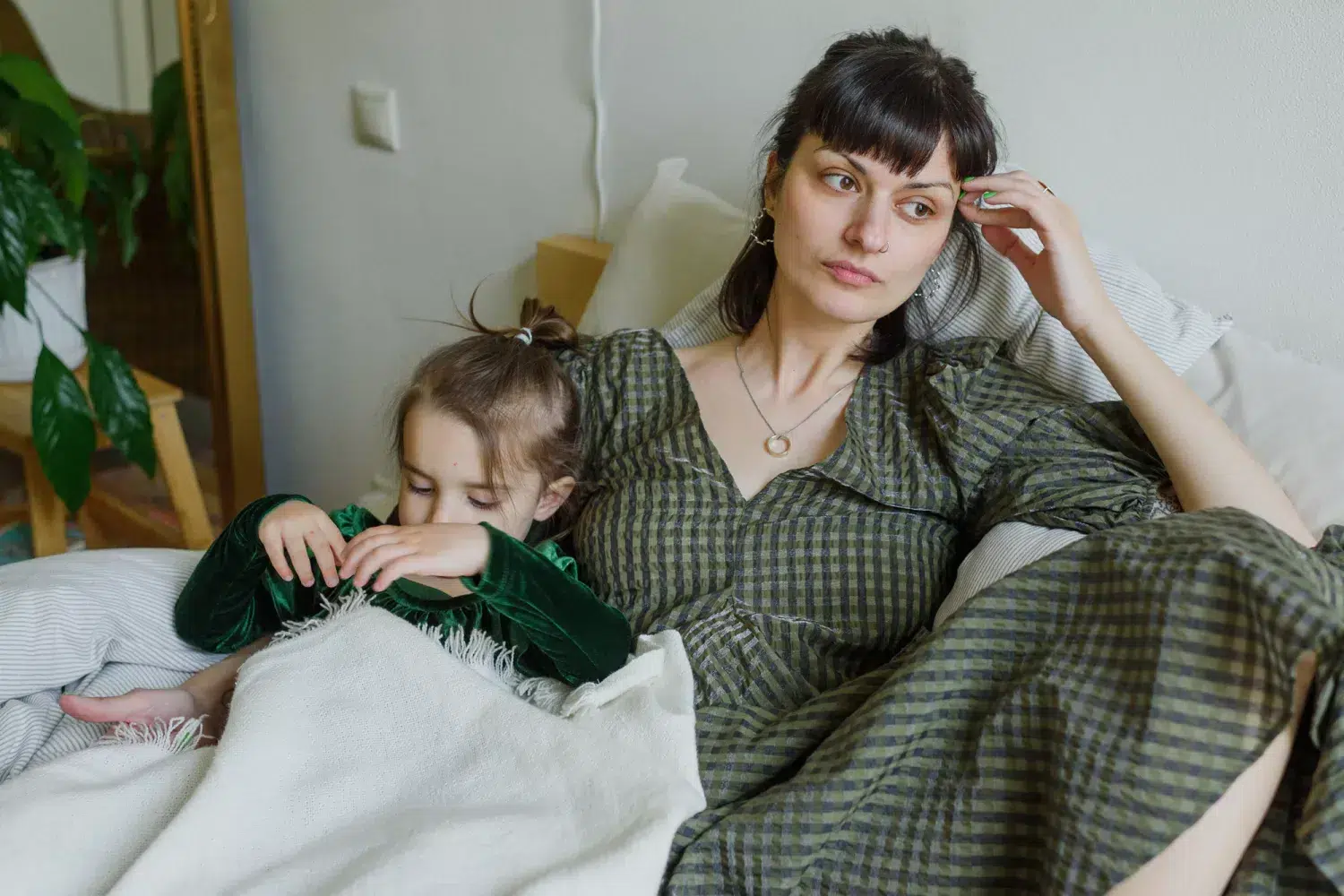Each mum who has PND, experiences it in a different way. But it is possible to break the cycle – you just need to know how.
One in five mums suffer from perinatal anxiety and depression. That’s 20%. That’s huge!
By definition, it stands for depression or anxiety that occurs during pregnancy or within the first year after birth.
I know many mums for which perinatal anxiety and depression (also known as PND) doesn’t just miraculously disappear when their child turns one.
It can go on for years and when a mum has perinatal anxiety and depression, it’s not only her that suffers. Everyone around her feels it, too. Relationships are strained. Attachment to children can be damaged. It can have long-lasting consequences for everyone.
“A mum who is in this PND cycle looks after her self less. Has less enjoyment in life, in her relationships and in her children which causes more negative thoughts about herself and her situation. And the cycle goes around again.”
Perinatal depression is a cycle and the first step to recovery is understanding how this cycle works and in turn how we can break the pattern.
It’s important to realise that less than 10% of depression is caused by a chemical imbalance. While anti-depressants can relieve the symptoms (and there’s no shame in taking them), they don’t fix the cause! It is the cause that I am interested in helping mums with.
What you need to know about the Perinatal Depression Cycle
The cycle starts with depressive or negative thinking patterns. These can start for numerous reasons including from stress related to falling pregnant, the pregnancy itself and of course from the challenges that come with raising children.
We all have days when we may think more negatively about our self, our abilities, our future, that’s part of the human experiencing.
However, for some, the excessive rumination on negative thoughts can turn into feelings of hopelessness and anxiety. This then turns into an overall state of heightened emotional awareness.
This highly emotional state, compounded with exhaustion from pregnancy and/or raising children causes mums to over-dream at night, getting less restful sleep. For mums who have newborns, infants or children who still wake overnight, restful sleep is even more elusive.
Physical discomfort during pregnancy including restless legs, pregnancy insomnia and difficulty getting comfortable due to physical changes, commonly stops pregnant women from getting restful sleep.
Without a good quantity of quality, restful sleep, this, in turn, causes more tiredness and exhaustion for mums. This continual, overwhelming state of exhaustion can decrease a mum’s overall motivation. Stop her from enjoying experiences including time with child. And also reduces serotonin levels (hence why anti-depressants which increase serotonin levels can help relieve symptoms).
With all of this going on, a mum who is in this PND cycle looks after her self less. Has less enjoyment in life, in her relationships and in her children which causes more negative thoughts about herself and her situation. And the cycle goes around again.

Understanding this PND cycle is crucial to helping a mum recover. Here are two things any mum can start to do today in her life to help reduce her symptoms and start to break this cycle.
1. Observe your thoughts
With negative thinking patterns being a defining factor of this cycle, stopping to look at how a mum is thinking and challenging negative thoughts is a perfect place to start the recovery from PND.
We can say to ourselves that we are a purple unicorn. We can think it daily. But we don’t believe it because we know it to be false. We can look at ourselves in the mirror and see a human and can actively challenge that thought.
A mother who has PND often can doubt her ability as a mum or her connection with her child. This can cause her to think of herself as a “bad mum” or a “failure”.
Unlike being able to dismiss the unicorn thought, a mum may often search for evidence to support the negative thought of being a “bad mum”. P
erhaps it’s because she feels that her baby isn’t “good” because they aren’t sleeping through the night. Or she feels guilty because of the way she is choosing to feed her baby (be it breastfeeding, formula feeding or a combination of the two).
For a mum with older children, maybe negative thoughts about what her child’s behaviour means for her ability to be a good parent can cause these thinking patterns. Whatever the cause it is important to look at the thought and ask these four questions to challenge it:
- What evidence do I have to support it?
- Is this evidence true and correct?
- What alternative thought could I replace it with?
- How can I get help or support with this aspect of parenting (if the thought is related to an aspect of parenting / being a mother)?
2. Increase the amount of quality sleep
Parenting is a 24-hour role. Particularly in the early years, parents will find themselves frequently up at nighttime feeding, resettling or reassuring their children. Some children sleep through the night at an early age, others may take years to.
Sleeping through the night is a developmental milestone and is not one that should be rushed for forced upon a child through sleep training methods.
But if a mum doesn’t help her child sleep more, then how is she to get more sleep? Sleep is always about quality over quantity.
Five hours of quality sleep is much better than 8 hours of non-restful sleep! There are four main things every mum can do to improve the quality of her sleep, regardless of the age of her child.
Avoid caffeine: This is tricky because if you’re exhausted then you may feel you need that large cup of coffee in the morning to wake you up.
Caffeine stays in the body for up to 10 hours. So while the first cup of coffee or tea in the morning may be out of your system by the time you go to bed any others you’ve had that day may not be.
I recommend mums avoid caffeine after 11 am to help reduce its potential impact on the quality of her sleep.
Go to bed earlier: It’s a catch-22 situation where mums stay up later in the evenings after the kids are asleep to have that elusive ‘me time’ or spend time with their partner/husband.
At the same time, they reduce the amount of sleep they have causing even more exhaustion the next day. Picking a bedtime, say 9.30pm and being in bed at least 15 minutes before to relax before falling asleep, can help a mum have the time in the evening but also not sacrifice her own sleep.
Turn off screens (mobile phones, televisions, tablets) at least an hour before bed: There is more and more research about the negative impact that the blue light emitted from our screens has on our sleep. Blue light causes a reduction in melatonin which is a hormone produced that helps us to feel sleepy.
Spending our evenings looking at screens means that we take longer to fall asleep not only from reduced melatonin. But because our brain is actively engaged in things, rather than winding down to help us relax
Eat well and exercise: A healthy diet and regular exercise not only improves the quality of our sleep but also helps reduce symptoms of PND. We all know what we should be eating. Complex carbohydrates. Protein. Healthy fats. Fresh fruit and vegetables. With plenty of water to wash it all down. But many of us don’t.
We fall into a habit (and yes it is just a habit) of snacking, eating our children’s leftovers and often overeating. If we’re feeling exhausted from not sleeping or we feel we’re too busy because of the family routine, we may forgo our daily exercise.
Even starting with 30 minutes of exercise a day will make a massive difference to a mum’s quality of sleep and her overall enjoyment of life.
It doesn’t have to be in a structured environment or at a gym. Go for a walk around the block. Take the kids to the park and play with a ball. Do an exercise video from YouTube. There are countless options and opportunities to exercise and eat well. We just have to make it a priority.
There is no one-size-fits-all approach
Each mum experiences PND in a different way. And of course to differing levels of severity. But starting with these strategies is a very effective and easy way to start to break the PND cycle.
It is not a mother’s fault that she gets perinatal depression. She has not done something “bad” and she is definitely not a bad mother.
Recovery is possible. I have had PND with all three of my children. With it being the most severe with my second. PND doesn’t discriminate. It doesn’t matter what age you are, how many children you have or where you live.
There is help out there.







